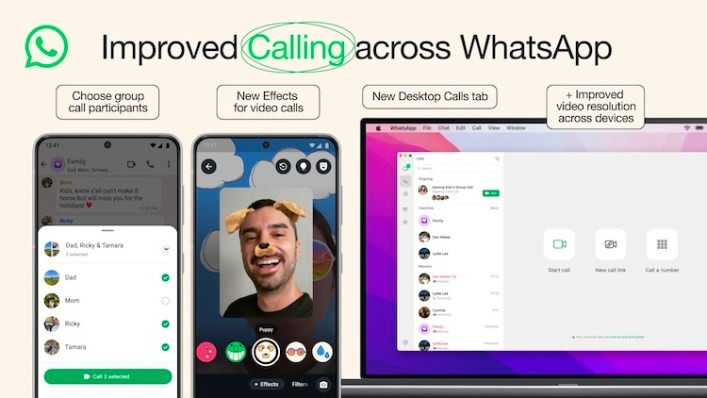WhatsApp Now Lets You Select Participants for Group Calls is a significant update that transforms how users engage in group conversations. This new feature gives you more control over your group calls, allowing you to selectively choose participants rather than relying on everyone in a group to be included automatically. With the ever-growing popularity of WhatsApp as a primary communication tool, this addition promises to enhance your experience, particularly when it comes to organizing calls more effectively.

The change addresses one of the most common frustrations many users faced when making group calls: not all group members necessarily need to be involved. Previously, anyone in a group could be part of a call once it was initiated, making the process cumbersome and, at times, inefficient. This new feature puts you in charge, letting you decide who joins a call and when they do, making group communication more streamlined.
In practice, this means that you can now select specific contacts within a group to join your call, making it ideal for scenarios where only certain members need to participate, such as work-related discussions, family updates, or small catch-ups. Whether you’re hosting a business meeting with only a few colleagues, planning a surprise event with only selected family members, or discussing a particular topic with a group of friends, this feature makes group calls more targeted and efficient.
One of the benefits of this update is that it simplifies the management of calls, especially for large groups. Before this update, if you started a group call, everyone in the group was included automatically. For you, this could lead to confusion or unnecessary disruptions, as not everyone may have wanted to join the conversation at that particular moment. Now, with the ability to handpick participants, the process feels much more manageable, especially when dealing with large groups where not everyone may be interested in or available for the call.
As a result, this feature could improve the overall experience for WhatsApp users, making it easier to engage in smaller, more intimate conversations without the need for multiple separate calls. Instead of organizing a new group chat or trying to schedule calls with specific individuals, you can simply initiate a group call and select the participants right then and there. It offers a lot of flexibility for spontaneous or planned discussions alike, offering you convenience when deciding who gets involved in the conversation.
Furthermore, this feature improves the efficiency of group communication. Whether it’s a business call, family check-in, or an informal catch-up with friends, you no longer have to deal with unnecessary calls from those who aren’t part of the relevant conversation. This is particularly important for those of you who are part of many large WhatsApp groups where not everyone necessarily needs to be contacted for every discussion. Now, you can keep your calls focused and relevant to those who need to be involved.
The flexibility to select participants is also vital for privacy and security. With the rise of virtual meetings and calls, controlling who is included in a conversation can help maintain the integrity of discussions, especially when sensitive or private topics are being discussed. You can ensure that only those who are meant to hear specific details are involved in the conversation, reducing the risk of inadvertent information sharing.
From a technical perspective, this update could also help optimize the call experience. With fewer participants, calls are likely to be smoother and have better audio quality, as there will be less congestion and interference from multiple connections. For you, this means that the overall quality of calls could improve, especially if you’re using WhatsApp for work-related matters, where clear communication is crucial. Additionally, for those in regions with unstable internet connections or slower data speeds, having fewer participants in a call could help ensure better connectivity and fewer disruptions.
While the update primarily targets WhatsApp’s group calls, it also indirectly affects how you interact with WhatsApp in other ways. The ability to handpick participants means you can now form more structured conversations based on the needs of each group. If you want to quickly catch up with one or two friends without disturbing the entire group, for instance, you can easily set up a call with only those individuals. The power to control who is included gives you greater flexibility in how you use WhatsApp as a communication tool, allowing you to manage your interactions more effectively.
For business users, this feature can improve meetings and collaborations. Instead of manually excluding members from a group chat call, this new update allows you to invite only the individuals you need for specific projects or discussions. This helps to streamline communication within teams, allowing for more focused meetings with the right participants. It can help reduce the feeling of being overwhelmed by unnecessary calls from colleagues who are not directly involved in a particular project or topic.
Additionally, this update is likely to make WhatsApp a more attractive platform for professional use. With the ability to control who joins a call, businesses can ensure that calls are more productive and that only relevant parties are included. It could even eliminate the need for using other communication tools, as WhatsApp now offers a more flexible solution for virtual meetings, whether internal or external.
In terms of family and friends, this feature is particularly useful for people who belong to multiple WhatsApp groups. For example, you might be part of a family group, a group of friends, and a community group, but not every member of these groups needs to be included in every conversation. With this update, you no longer need to send separate invites or messages to those who are interested in joining a call; instead, you can simply select the participants that matter at the time. It’s a small change, but it can make organizing and managing your calls much more efficient.
If you’re wondering how this new feature works, it’s simple. When you initiate a group call, WhatsApp now lets you choose who to include. If you’re already in a group, you can click on the group name, then tap the option to make a call. From there, you’ll be given the choice to select specific members from the group to participate. Once you’ve made your selections, you can start the call, and only the chosen members will be notified and included in the conversation.
This update could also be seen as a response to user feedback. WhatsApp is continuously evolving based on how people use the app, and this change is a clear example of the company listening to the needs of its users. The ability to select participants was one of the most-requested features for WhatsApp group calls, and now that it’s available, it’s clear that WhatsApp is committed to improving the user experience, especially when it comes to group communication.
WhatsApp’s ability to allow users to select participants for group calls could have broad implications for other messaging apps as well. As WhatsApp continues to add features that enhance user control and improve communication efficiency, other platforms may follow suit, adopting similar features to stay competitive. As a result, it could raise the bar for communication tools across the board, making it easier for you to manage your group interactions across different apps and platforms.
WhatsApp’s decision to allow users to select participants for group calls is a noteworthy step forward for the app, improving the quality and flexibility of communication. For you, this means less clutter, more focused conversations, and a greater sense of control over who you interact with. Whether for personal or professional use, this feature significantly enhances the way you engage with others on the platform, ensuring that calls are more relevant, streamlined, and manageable. As WhatsApp continues to evolve and innovate, this update marks an important development that will likely shape the future of communication within the app.










Add Comment